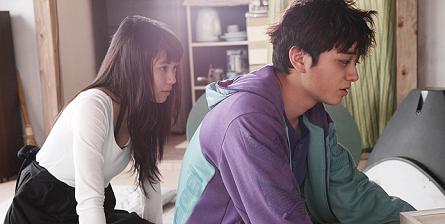Paolo here, back with yet more TIFF films from the final weekend.

The first film today is Sion Sino's HIMIZU, using the backdrop of the March 11 earthquake to tell the story of fifteen year old Yuichi Sumida's (Shota Sometani) violent dreams and reality. One of his dreams puts him in the Fukushima rubble, where he finds a pistol inside a washing machine and when he wakes up, he checks his own washer to see if it's true. What ensues is school absenteeism, stalking from a lovesick and excitable girl, abuse from his father (who tells him he should drowned him in a river) and beatings from Yakuza loan sharks.
At one point he has convulsions, a reaction to his unbelievably painful life. It's a raw and forceful performance from Sometani that might be ignored by larger audiences because of world cinema ghettoization. Sino's approach in telling Sumida's story meanders after the point when Sumida stands up to get revenge from these adults.

I feel snobby when I miss films from TIFF's Midnight Madness programme but fortunately, they play them again days after their premieres. Yesterday brought us LOVELY MOLLY from BLAIR WITCH director Eduardo Sanchez. It starts with the young titular character (Gretchen Lodge) explaning, teary eyed, that the actions that her body is committing is not really her. Her seemingly perfect marriage and childhood home disintegrate because of an incubus that haunts her. It is a competent horror film with the occassional excellent moment, especially those in which Lodge confronts her inner monster or becomes one. Lodge, in a debut performance, commits to the role with both eloquence and ferocity.
The transitions between regular film and video cam equipment are smooth.The scares aren't cheap but the intervals between them are far too long. While we're waiting for either the invisible ghost or Molly to attack, we're left with watching close-ups of furniture while eerie music plays on the background. The film can't rely only on great sound design to make its house look creepy. And why does the house have a security system but not proper lighting?
New Isabelle Huppert and Mira Sorvino movies after the jump.
Have you ever wished that there was a movie where Isabelle Huppert plays 'horsy,' or dances near a stripper pole with a hairy Belgian guy inside a rural night club before puking it all up curb afterwards?

Anne Fontaine's MY WORST NIGHTMARE seems like it was conceived during a drinking game wherein each contestant thinks of a scenario that the actress doesn't deserve. It plays like a Heigl movie with Huppert playing a high powered art curator when all she needs is love from a scruffy working-class man.
It's incredulous that the eventual lovebirds get too close, living together and taking care of each other's children all because he does construction in her house. Or that he's coarse and talks to her in a demeaning way and he's supposed to be funny and charming. But Fontaine's 'matter of fact' approach to the fashionable French woman is admirable and who doesn't want to see Huppert yell at other people for comic effect. She's often dour in her other 'important' roles, but she can pull off relaxed acting just as gracefully.

We end with UNION SQUARE, set in the titular Manhattan area where high-heeled Lucy Pace (welcome back, Mira Sorvino!) tries to surprise her boyfriend Jay. Sorvino plays Lucy as the kind of crass woman who lets a whole spacious area know the intimate details of her phone conversations. At first she's a grating presence and her personality might have gotten her dumped over the phone. To console herself she crashes the apartment of her uptight sister, Jenny (Tammy Blanchard). After a series of awkward 'I'm scowling at our differences' scenes, Lucy reveals a family emergency that hits both women hard. In these moments we can't help but cry and empathize with these women, no matter how disconnected and hostile they might initially be.
Sorvino and Blachard elevate their characters from the stereotypes they initially seem to be, Lucy becoming a maternal woman and Jenny moving through stages of hostile facades towards becoming Lucy's sister instead of a snob with aspirations. They look like actresses at the top of their game that need to be working with more auteurs.